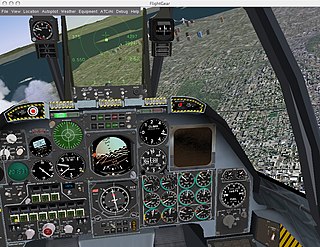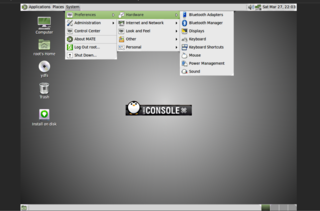
Mandriva Linux is a discontinued Linux distribution developed by Mandriva S.A.
In computing, cross-platform software is computer software that is designed to work in several computing platforms. Some cross-platform software requires a separate build for each platform, but some can be directly run on any platform without special preparation, being written in an interpreted language or compiled to portable bytecode for which the interpreters or run-time packages are common or standard components of all supported platforms.

Tux Racer is a 2000 open-source winter sports racing video game starring the Linux mascot, Tux the penguin. It was originally developed by Jasmin Patry as a computer graphics project at the University of Waterloo. Later on, Patry and the newly founded Sunspire Studios, composed of several former students of the university, expanded it. In the game, the player controls Tux as he slides down a course of snow and ice collecting herrings.

SuperTux is a free and open-source two-dimensional platform video game inspired by Nintendo's Super Mario Bros. series. The player character is Tux, the official mascot of the Linux kernel.

Raptor: Call of the Shadows is a vertically scrolling shooter developed by Cygnus Studios and published by Apogee Software. Its working title was "Mercenary 2029". It was released on April 1, 1994 for MS-DOS compatible systems. The first episode of the game, "Bravo Sector", was distributed as shareware. The other two episodes were sold commercially.

XBill is an arcade style game for the X Window System. The game features a bespectacled character known as "Bill". The goal is to prevent Bill's legions of clones from installing "Wingdows", a virus "cleverly designed to resemble a popular operating system", on a variety of computers running other operating systems. It was very popular among Linux gamers at the end of the 1990s, beating out Quake, though not Quake II, as Linux Journal reader's favourite Linux game in 1999.
Roxor Games, Inc. is a 25-person company based in Austin, Texas that develops video game software for the arcade and home markets. Founded in 2002, Roxor works with developers of open source software to deploy games on a Linux-based hardware platform in the arcade and on multiple home consoles. Although their most well known product, In The Groove, is proprietary software, the developers regularly contribute code back to the open source project StepMania upon which In The Groove is based.

Linux XP was a Fedora Linux-based shareware Linux distribution designed to imitate Windows environment using GNOME desktop; it could run some Microsoft Windows programs using the Wine compatibility layer. Linux XP had to be registered within 99 startups after installation, or the OS would deactivate.

Korora was a remix of the Fedora Linux distribution. Originally Kororaa was a binary installation method for Gentoo Linux which aimed for easy installation of a Gentoo system by using install scripts instead of manual configuration. The name derives from the Māori word kororā – the little penguin.

Metalink is an extensible metadata file format that describes one or more computer files available for download. It specifies files appropriate for the user's language and operating system; facilitates file verification and recovery from data corruption; and lists alternate download sources.
EVO Smart Console is a line media PCs and video game consoles marketed in the seventh generation of video game consoles. The system was produced by Envizions, a company based in Anniston, Alabama.

An open-source video game, or simply an open-source game, is a video game whose source code is open-source. They are often freely distributable and sometimes cross-platform compatible.

Linux is a family of open-source Unix-like operating systems based on the Linux kernel, an operating system kernel first released on September 17, 1991, by Linus Torvalds. Linux is typically packaged as a Linux distribution (distro), which includes the kernel and supporting system software and libraries, many of which are provided by the GNU Project. Many Linux distributions use the word "Linux" in their name, but the Free Software Foundation uses and recommends the name "GNU/Linux" to emphasize the use and importance of GNU software in many distributions, causing some controversy.
Linux-based operating systems can be used for playing video games. Because many games are not natively supported for the Linux kernel, various software has been made to run Windows games, such as Wine, Cedega, and Proton, and managers such as Lutris and PlayOnLinux. The Linux gaming community has a presence on the internet with users who attempt to run games that are not officially supported on Linux.

Fedora Linux is a Linux distribution developed by the Fedora Project. It was originally developed in 2003 as a continuation of the Red Hat Linux project. It contains software distributed under various free and open-source licenses and aims to be on the leading edge of open-source technologies. It is now the upstream source for CentOS Stream and Red Hat Enterprise Linux.

SuperTuxKart (STK) is a free and open-source kart racing game, distributed under the terms of the GNU General Public License, version 3. It features mascots of various open-source projects. SuperTuxKart is cross-platform, running on Linux, macOS, Windows, iOS (beta), Android systems and Nintendo Switch (homebrew).

Tux, of Math Command is an open source arcade-style video game for learning arithmetic, initially created for Linux.

Tux is a penguin character and the official brand character of the Linux kernel. Originally created as an entry to a Linux logo competition, Tux is the most commonly used icon for Linux, although different Linux distributions depict Tux in various styles. The character is used in many other Linux programs and as a general symbol of Linux.

Emmabuntüs is a Linux distribution derived from Debian and designed to facilitate the restoration of computers donated to humanitarian organizations like the Emmaüs Communities.

LinuxConsole is a Linux distribution independently developed by Yann Le Doaré. LinuxConsole should be written as a single word, and the use of the word "console" in the name does not relate to Linux's system console mode but instead represents its aim of providing a system more simple to use similar to that of a gaming console. This distro is built from scratch by developers from France, and has support for multiple languages. It is not based on any other Linux distribution and primarily features being lightweight and easily accessible. LinuxConsole can function as a live CD or live USB. It can also be installed as a complete operating system.
















